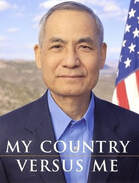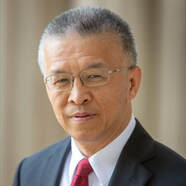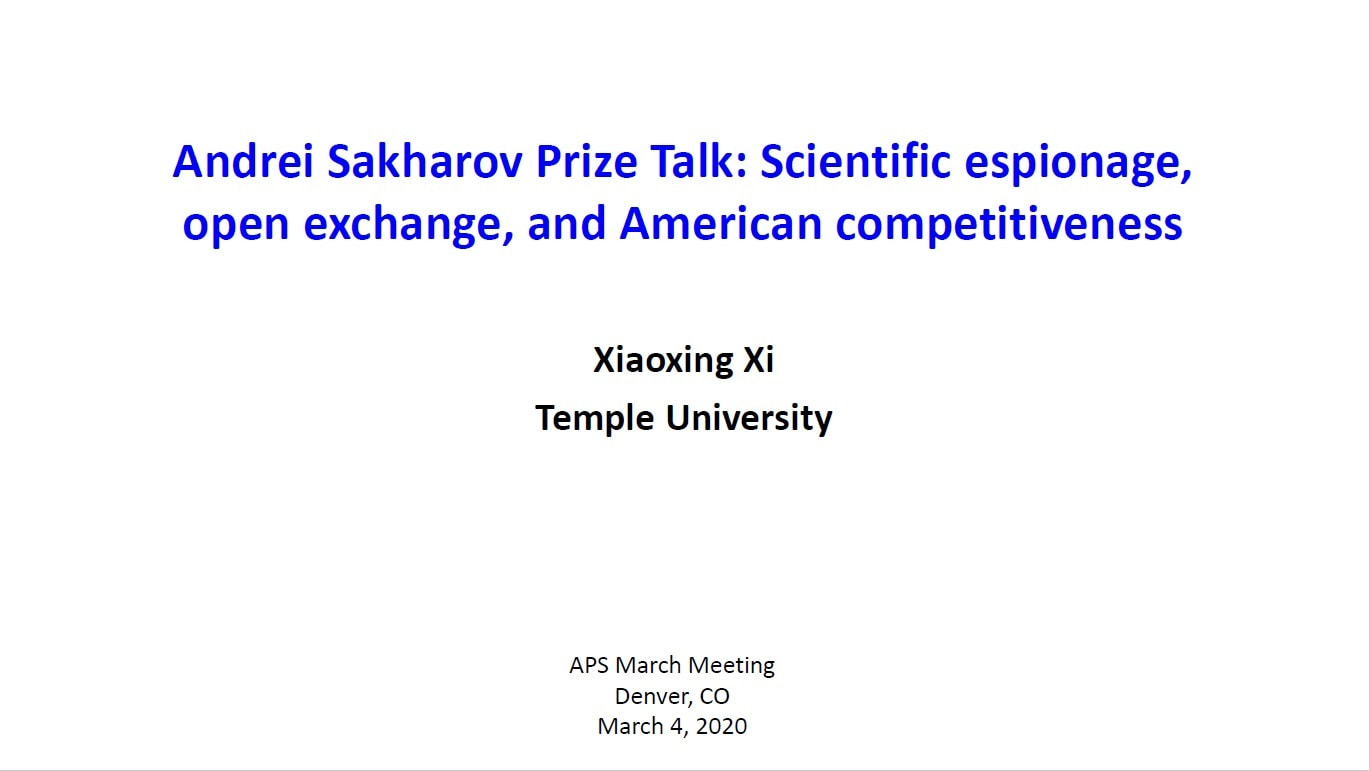|
Visit Alien Land Bills for more coverage and up-to-date developments
|
|
Neal Lane*, Steven Pei*, Jeremy Wu*
The U.S. science and technology enterprise is unparalleled, and its contribution to the security and well-being of the American people is indisputable. In recent years, however, federal initiatives intended to protect American science and technology have strayed from their purpose and are rendering our nation increasingly unable to draw and retain science and technology talent – putting our competitive edge at risk during an era of techno-competition with key rivals.
Our scientific success is rooted in the core values of collaboration, honesty, transparency, integrity, the fair competition of ideas, and the protection of intellectual capital. Some foreign entities do not share these values and are working to illicitly acquire our research and innovation. This necessitates laws — and law enforcement.
But it is vital that law enforcement guidelines and procedures be clear and fair for maintaining public trust, upholding individual rights, and promoting accountability and consistency within the justice system. Otherwise, we can expect our competitive edge in science and technology to wane, as well as our standing as a leading democracy.
The China Initiative
In 2018, during the Trump administration, the Justice Department launched the China Initiative to prioritize “Chinese trade theft cases” and “bring them to an appropriate conclusion.” This enforcement strategy emphasized “non-traditional collectors,” defined as professors, students, and other ordinary citizens who could be co-opted into collecting and transferring valuable information and cutting-edge technology contrary to U.S. interests.
The focus on non-traditional collectors led to the 2021 arrest of MIT professor Gang Chen, who was accused of concealing ties to China in federal grant applications. His charges were eventually dismissed, but the case shocked the research community. Through the China Initiative, hundreds of academic researchers were subjected to intense investigations and prosecutions. None were ultimately convicted of espionage.
Alarmed by the apparent presumption of guilt based on ethnicity and affiliation with a single country, beginning in 2021, over 3,100 faculty of 231 universities from all 50 states, the District of Columbia, and Puerto Rico sent open letters to Attorney General Merrick Garland, calling for the program’s termination. The letters argued that the initiative had lost sight of its purpose, perpetuated biases and risked racial profiling, and discouraged talented individuals from studying in and immigrating to the United States, where they could contribute to America’s economic growth and competitive position in the world.
In February 2022, the Department of Justice ended the China Initiative, concluding it was “not the right approach.” Ending it was an important step — but the program had already created a climate of fear and confusion on campuses and laboratories across the nation and abroad.
A Continued Climate of Fear
Since the end of the initiative, foreign researchers and students, green-card holders, and even American citizens have continued to face ordeals at U.S. ports of entry. Some have been detained for hours or pressured to share passwords to or surrender their devices. Some new and returning Chinese graduate students have even been denied entry to the U.S. following prolonged interrogations and, in some cases, solitary confinement. U.S. border officials are undoubtably tasked with a difficult — and vital — job. But these incidents raise serious questions regarding the criteria used to guide law enforcement’s initiation of secondary inspections at ports of entry.
A gap in communications, in part due to a lack of clarity in federal policy, has opened between policymakers and those charged with enforcing the law.
Since World War II, the U.S. has maintained its leadership in science and technology in large part by being the premier destination for the world’s brightest minds. To avoid losing this enormous benefit, we must ensure that law enforcement follows clear and fair national science and technology policy. Otherwise, we can expect our global preeminence in science and technology, as well as our standing as a leading democracy, to wane.
The artificial intelligence (AI) workforce offers one example. The United States is currently at the forefront of advancements in AI. But lately, its lead has begun to slip. It now hosts approximately 42% of the world’s premier AI talent, a decline from around 59% three years earlier. According to the think tank MacroPolo, more than half of AI researchers in the U.S. are from China. Based on data from the State Department, the number of students from China studying in the U.S. has dropped by 20% from a peak of 370,000 in 2019. China now educates far more scientists and engineers in its own universities than the United States.
New Enforcement Strategies Risk the Same Mistakes
In February 2023, the departments of Justice and Commerce launched the Disruptive Technology Strike Force and brought together experts throughout government — including the FBI and Homeland Security Investigations (HSI) — to prevent foreign adversaries from unlawfully acquiring our advanced technology. And last December, Homeland Security Secretary Alejandro Mayorkas directed the Homeland Security Academic Partnership Council, formed less than a year ago, to assess and offer recommendations regarding “foreign malign influence” in American institutions of higher education.
While important, these initiatives do not necessarily include protection of civil rights and efforts both to attract foreign talent and encourage international basic research collaboration. These are critical to the nation’s science and technology enterprise, both industrial and academic.
Protecting intellectual property and national security are critical. But these initiatives must be balanced with protecting individual rights, welcoming foreign talent, and encouraging international basic research collaboration. Otherwise, we risk repeating past mistakes.
A Way Forward
In August 2021, the White House tasked the Office of Science and Technology Policy (OSTP) with setting clear rules for research security and researcher responsibility. It charged the office with finding ways to protect America’s security while ensuring policies not fuel xenophobia or prejudice, working in close partnership with the National Security Council staff, fellow Cabinet agencies, and other federal agencies through the National Science and Technology Council (NSTC).
As part of the OSTP effort, the National Science Foundation (NSF) commissioned two studies by JASON, an independent group of scientists with unique expertise that advises the U.S. government on national security matters related to science and technology.
The resulting report, titled “Fundamental Research Security” and released in 2019, discusses issues in research security and reaffirms the importance of foreign-born scientists to U.S. leadership in science and technology. The 2024 report, titled “Safeguarding the Research Enterprise,” recommends an assessment approach to ensure NSF continues to maintain the openness of our research ecosystem while safeguarding needed security.
With its sharp focus on research security, OSTP has set a balanced path to guide policies of federal agencies that support research. There is a similar need for the FBI, HSI, and other federal law enforcement agencies to coordinate their policies using comparable principles and set clear, fair guidelines and procedures.
Given OSTP’s unique role and capability within NSTC, it should also coordinate with all key law enforcement agencies to close the apparent gap in communication between national science and technology policy set by NSTC and agents at the forefront of law enforcement. In doing, it can protect America’s security and economic competitiveness while minimizing unintended negative impacts and associated chilling effects on the science and technology community.
Rice University's Baker Institute: An Urgent Call for Clear and Fair Law Enforcement Guidelines and Procedures for Research Security
Carter Center's US-China Perception Monitor《中美印象》: 为研究安全制定明确和公平的执法政策的紧急呼吁——如何即捍卫美国国家安全又保护学术交流
2024/05/31 An Urgent Call for Clear and Fair Law Enforcement Guidelines and Procedures for Research Security (PDF)
This piece was originally published by Rice University’s Baker Institute for Public Policy; full text is available here. The views expressed therein are those of the individual author(s), and do not necessarily represent the views of Rice University’s Baker Institute for Public Policy.
* Dr. Neal Lane is Senior Fellow in Science and Technology Policy; Professor of Physics and Astronomy Emeritus. Dr. Steven Pei is Professor of Electrical Engineering, University of Houston; Co-Organizer, APA Justice Task Force; Founding Chair, United Chinese Americans. Dr. Jeremy Wu is Founder and Co-Organizer, APA Justice Task Force.
Our scientific success is rooted in the core values of collaboration, honesty, transparency, integrity, the fair competition of ideas, and the protection of intellectual capital. Some foreign entities do not share these values and are working to illicitly acquire our research and innovation. This necessitates laws — and law enforcement.
But it is vital that law enforcement guidelines and procedures be clear and fair for maintaining public trust, upholding individual rights, and promoting accountability and consistency within the justice system. Otherwise, we can expect our competitive edge in science and technology to wane, as well as our standing as a leading democracy.
The China Initiative
In 2018, during the Trump administration, the Justice Department launched the China Initiative to prioritize “Chinese trade theft cases” and “bring them to an appropriate conclusion.” This enforcement strategy emphasized “non-traditional collectors,” defined as professors, students, and other ordinary citizens who could be co-opted into collecting and transferring valuable information and cutting-edge technology contrary to U.S. interests.
The focus on non-traditional collectors led to the 2021 arrest of MIT professor Gang Chen, who was accused of concealing ties to China in federal grant applications. His charges were eventually dismissed, but the case shocked the research community. Through the China Initiative, hundreds of academic researchers were subjected to intense investigations and prosecutions. None were ultimately convicted of espionage.
Alarmed by the apparent presumption of guilt based on ethnicity and affiliation with a single country, beginning in 2021, over 3,100 faculty of 231 universities from all 50 states, the District of Columbia, and Puerto Rico sent open letters to Attorney General Merrick Garland, calling for the program’s termination. The letters argued that the initiative had lost sight of its purpose, perpetuated biases and risked racial profiling, and discouraged talented individuals from studying in and immigrating to the United States, where they could contribute to America’s economic growth and competitive position in the world.
In February 2022, the Department of Justice ended the China Initiative, concluding it was “not the right approach.” Ending it was an important step — but the program had already created a climate of fear and confusion on campuses and laboratories across the nation and abroad.
A Continued Climate of Fear
Since the end of the initiative, foreign researchers and students, green-card holders, and even American citizens have continued to face ordeals at U.S. ports of entry. Some have been detained for hours or pressured to share passwords to or surrender their devices. Some new and returning Chinese graduate students have even been denied entry to the U.S. following prolonged interrogations and, in some cases, solitary confinement. U.S. border officials are undoubtably tasked with a difficult — and vital — job. But these incidents raise serious questions regarding the criteria used to guide law enforcement’s initiation of secondary inspections at ports of entry.
A gap in communications, in part due to a lack of clarity in federal policy, has opened between policymakers and those charged with enforcing the law.
Since World War II, the U.S. has maintained its leadership in science and technology in large part by being the premier destination for the world’s brightest minds. To avoid losing this enormous benefit, we must ensure that law enforcement follows clear and fair national science and technology policy. Otherwise, we can expect our global preeminence in science and technology, as well as our standing as a leading democracy, to wane.
The artificial intelligence (AI) workforce offers one example. The United States is currently at the forefront of advancements in AI. But lately, its lead has begun to slip. It now hosts approximately 42% of the world’s premier AI talent, a decline from around 59% three years earlier. According to the think tank MacroPolo, more than half of AI researchers in the U.S. are from China. Based on data from the State Department, the number of students from China studying in the U.S. has dropped by 20% from a peak of 370,000 in 2019. China now educates far more scientists and engineers in its own universities than the United States.
New Enforcement Strategies Risk the Same Mistakes
In February 2023, the departments of Justice and Commerce launched the Disruptive Technology Strike Force and brought together experts throughout government — including the FBI and Homeland Security Investigations (HSI) — to prevent foreign adversaries from unlawfully acquiring our advanced technology. And last December, Homeland Security Secretary Alejandro Mayorkas directed the Homeland Security Academic Partnership Council, formed less than a year ago, to assess and offer recommendations regarding “foreign malign influence” in American institutions of higher education.
While important, these initiatives do not necessarily include protection of civil rights and efforts both to attract foreign talent and encourage international basic research collaboration. These are critical to the nation’s science and technology enterprise, both industrial and academic.
Protecting intellectual property and national security are critical. But these initiatives must be balanced with protecting individual rights, welcoming foreign talent, and encouraging international basic research collaboration. Otherwise, we risk repeating past mistakes.
A Way Forward
In August 2021, the White House tasked the Office of Science and Technology Policy (OSTP) with setting clear rules for research security and researcher responsibility. It charged the office with finding ways to protect America’s security while ensuring policies not fuel xenophobia or prejudice, working in close partnership with the National Security Council staff, fellow Cabinet agencies, and other federal agencies through the National Science and Technology Council (NSTC).
As part of the OSTP effort, the National Science Foundation (NSF) commissioned two studies by JASON, an independent group of scientists with unique expertise that advises the U.S. government on national security matters related to science and technology.
The resulting report, titled “Fundamental Research Security” and released in 2019, discusses issues in research security and reaffirms the importance of foreign-born scientists to U.S. leadership in science and technology. The 2024 report, titled “Safeguarding the Research Enterprise,” recommends an assessment approach to ensure NSF continues to maintain the openness of our research ecosystem while safeguarding needed security.
With its sharp focus on research security, OSTP has set a balanced path to guide policies of federal agencies that support research. There is a similar need for the FBI, HSI, and other federal law enforcement agencies to coordinate their policies using comparable principles and set clear, fair guidelines and procedures.
Given OSTP’s unique role and capability within NSTC, it should also coordinate with all key law enforcement agencies to close the apparent gap in communication between national science and technology policy set by NSTC and agents at the forefront of law enforcement. In doing, it can protect America’s security and economic competitiveness while minimizing unintended negative impacts and associated chilling effects on the science and technology community.
Rice University's Baker Institute: An Urgent Call for Clear and Fair Law Enforcement Guidelines and Procedures for Research Security
Carter Center's US-China Perception Monitor《中美印象》: 为研究安全制定明确和公平的执法政策的紧急呼吁——如何即捍卫美国国家安全又保护学术交流
2024/05/31 An Urgent Call for Clear and Fair Law Enforcement Guidelines and Procedures for Research Security (PDF)
This piece was originally published by Rice University’s Baker Institute for Public Policy; full text is available here. The views expressed therein are those of the individual author(s), and do not necessarily represent the views of Rice University’s Baker Institute for Public Policy.
* Dr. Neal Lane is Senior Fellow in Science and Technology Policy; Professor of Physics and Astronomy Emeritus. Dr. Steven Pei is Professor of Electrical Engineering, University of Houston; Co-Organizer, APA Justice Task Force; Founding Chair, United Chinese Americans. Dr. Jeremy Wu is Founder and Co-Organizer, APA Justice Task Force.
Rep. Judy Chu - New Year Greetings and Review of 2023
|
YouTube: https://www.youtube.com/watch?v=mx5cnWjbxqA (video 11:56). A transcript of her talk is posted at: https://bit.ly/48AZIqx
Subscribe to the APA Justice YouTube Channel and watch additional APA Justice videos.
|
During the first APA Justice monthly meeting of 2024, Rep. Judy Chu, Chair of the Congressional Asian Pacific American Caucus, reviewed the accomplishments of 2023 and looked forward to 2024.
"One of the most pressing issues last year was the surge in legislation seeking to restrict land ownership for Chinese and other immigrant communities across various states and in Congress... This is why I recently joined Congress member Al Green to introduce a bill, the Preemption of Real Property Discrimination Act, prohibiting such state laws from taking effect. We have to do everything we can to push this bill forward... So as we continue this work to protect the civil rights of our community, we must also ensure that our communities' resilient history is recognized, celebrated, and preserved... In closing, I want to underscore how important groups like APA justice are in making all of these achievements happen over the past year... I encourage you to stay strong on the road ahead as we work together this year, speaking out for those being targeted just for being Chinese or Asian American and continue building this diverse coalition of leaders across the country... I look forward to working with you to make this nation more inclusive of all people where no one should be made to feel unsafe or un-American because of who they are. And I will continue to strive for an America where everybody is treated equally," Rep. Chu said. |
Rep. Ted Lieu Delivered Bicameral Coalition Letter to Attorney General
Calling for Investigation of Racial Profiling of Asians
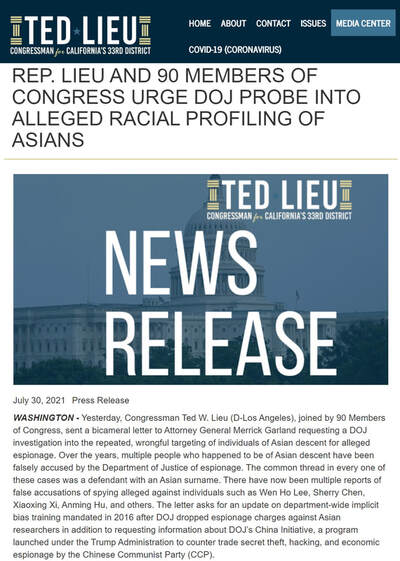 Click image to view the news release
Click image to view the news release
On July 29, 2021, Rep. Ted Lieu delivered a bicameral coalition letter to Attorney General Merrick Garland calling for an investigation into the Department of Justice's "repeated, wrongful targeting of individuals of Asian descent for alleged espionage."
"Over the years, multiple people who happened to be of Asian descent have been falsely accused by the Department of Justice of espionage," including the false accusations of spying alleged against Wen Ho Lee, Sherry Chen, Xiaoxing Xi, Anming Hu, and many others.
"The common thread in every one of these cases was a defendant with an Asian surname — and an innocent life that was turned upside down."
"No person should be viewed by our government as more suspicious because of the individual’s race. We thus request an update on the mandated implicit bias training and request an investigation to determine whether the Department of Justice has a written or unwritten policy, program, pattern or practice of using race (or other civil rights classifications such as religion, gender and national origin) in targeting people for arrest, surveillance, security clearance denials or other adverse actions. We also specifically request whether, under the 'China Initiative,' there is a written or unwritten policy, program, pattern or practice to target people based on their race, ethnicity or national origin."
Links and References
2021/08/20 South China Morning Post: Biden urged to pause and review China Initiative for racial profiling
2021/08/19 Rep. Don Beyer: Response in Joining Bicameral Letter
2021/08/10 The Guardian editorial: The Guardian view on anti-Chinese suspicion: target espionage, not ethnicities
2021/08/09 APS News: Current US Policy on China: The Risk to Open Science
2021/07/31 South China Morning Post: US to retry University of Tennessee professor on fraud charges following mistrial, drawing outcry
2021/07/30 Rep. Ted Lieu: Rep. Lieu and 90 Members of Congress Urge DOJ Probe into Alleged Racial Profiling of Asians
Axios: Nearly 100 members of Congress call for probe into DOJ's alleged racial profiling of Asians
2021/07/29 Rep. Ted Lieu: Bicameral coalition letter to AG Merrick Garland
2021/07/26 Los Angeles Times: After feds drop charges against Chinese scholars, new concerns about racial profiling
2021/07/21 北美新视界: 国会众议员刘云平 (Ted Lieu)呼吁华社帮助调查司法部
"Over the years, multiple people who happened to be of Asian descent have been falsely accused by the Department of Justice of espionage," including the false accusations of spying alleged against Wen Ho Lee, Sherry Chen, Xiaoxing Xi, Anming Hu, and many others.
"The common thread in every one of these cases was a defendant with an Asian surname — and an innocent life that was turned upside down."
"No person should be viewed by our government as more suspicious because of the individual’s race. We thus request an update on the mandated implicit bias training and request an investigation to determine whether the Department of Justice has a written or unwritten policy, program, pattern or practice of using race (or other civil rights classifications such as religion, gender and national origin) in targeting people for arrest, surveillance, security clearance denials or other adverse actions. We also specifically request whether, under the 'China Initiative,' there is a written or unwritten policy, program, pattern or practice to target people based on their race, ethnicity or national origin."
Links and References
2021/08/20 South China Morning Post: Biden urged to pause and review China Initiative for racial profiling
2021/08/19 Rep. Don Beyer: Response in Joining Bicameral Letter
2021/08/10 The Guardian editorial: The Guardian view on anti-Chinese suspicion: target espionage, not ethnicities
2021/08/09 APS News: Current US Policy on China: The Risk to Open Science
2021/07/31 South China Morning Post: US to retry University of Tennessee professor on fraud charges following mistrial, drawing outcry
2021/07/30 Rep. Ted Lieu: Rep. Lieu and 90 Members of Congress Urge DOJ Probe into Alleged Racial Profiling of Asians
Axios: Nearly 100 members of Congress call for probe into DOJ's alleged racial profiling of Asians
2021/07/29 Rep. Ted Lieu: Bicameral coalition letter to AG Merrick Garland
2021/07/26 Los Angeles Times: After feds drop charges against Chinese scholars, new concerns about racial profiling
2021/07/21 北美新视界: 国会众议员刘云平 (Ted Lieu)呼吁华社帮助调查司法部
Speak Up Against Racial Profiling
|
Professor Xiaoxing Xi, 2020 Andrei Sakharov Prize recipient and physics professor of Temple University, speaks about his ordeal as a racial profiling victim. "Don’t think this can't happen to you... The right question to ask is whether the entire group of Chinese scientists should be singled out for targeting and put under the suspicion as 'non-traditional collectors' for China. That is racial profiling. That is wrong. We should all speak up against it." (28:57)
|
|
Asian Pacific American Justice Task Force
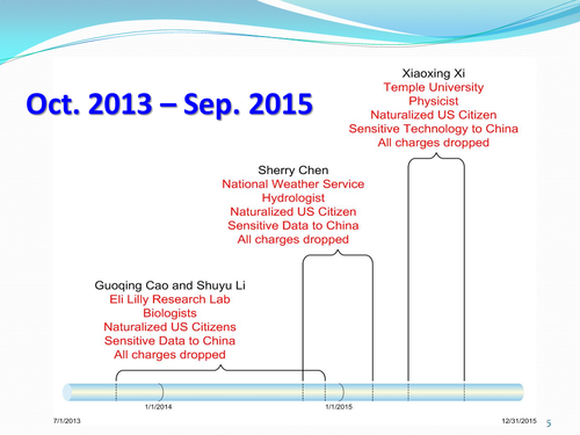
Within two weeks after the New York Times reported the dismissal of the criminal case against Sherry Chen, an award-winning hydrologist at the National Weather Service, a press conference was held on Capitol Hill in May 2015. On the same day, Professor Xiaoxing Xi, Acting Chair of the Physics Department at the Temple University, was arrested and also accused of espionage-related charges.
During the press conference, community organizations expressed their concerns of apparent racial profiling in the Sherry Chen case. The Congressional Asian Pacific American Caucus (CAPAC) announced that 22 CAPAC members signed a letter to then-Attorney General Loretta Lynch requesting an investigation of the Sherry Chen case and a review of the policy, program and pattern or practice of using race or other civil rights classifications that target federal employees.
The pattern of targeting innocent Chinese American scientists was further confirmed by the dismissal of Professor Xi’s case in September 2015. CAPAC Chair Judy Chu called for a regular medium and platform to facilitate more timely and stronger communications to understand and respond to the growing pattern and concerns. A group of volunteers was formed to serve this purpose in the Fall of 2015. This APA Justice website is a product of the group's activities to provide information and facilitate connections and discussions within and beyond the community.
During the press conference, community organizations expressed their concerns of apparent racial profiling in the Sherry Chen case. The Congressional Asian Pacific American Caucus (CAPAC) announced that 22 CAPAC members signed a letter to then-Attorney General Loretta Lynch requesting an investigation of the Sherry Chen case and a review of the policy, program and pattern or practice of using race or other civil rights classifications that target federal employees.
The pattern of targeting innocent Chinese American scientists was further confirmed by the dismissal of Professor Xi’s case in September 2015. CAPAC Chair Judy Chu called for a regular medium and platform to facilitate more timely and stronger communications to understand and respond to the growing pattern and concerns. A group of volunteers was formed to serve this purpose in the Fall of 2015. This APA Justice website is a product of the group's activities to provide information and facilitate connections and discussions within and beyond the community.
America is Our Home
Rep. Ted Lieu (CA) published an op-ed in the Washington Post on July 16, 2019, titled I have served in the Air Force and in Congress. People still tell me to ‘go back’ to China
APAPA statement | OCA statement
APAPA statement | OCA statement
APA Justice Task Force is a non-partisan platform to build a sustainable ecosystem that addresses racial profiling concerns and to facilitate, inform, and advocate on selected issues related to justice and fairness for the Asian Pacific American community. "
|
A definition of Racial Profiling is "the use of race or ethnicity as grounds for suspecting someone of having committed an offense." In its extreme, it led to the enactment of the Chinese Exclusion Act in 1882 and the internment of Japanese Americans during the Second World War. In more recent times, Chinese American scientists such as Wen Ho Lee, Sherry Chen, and Xiaoxing Xi have been wrongly targeted for espionage-related prosecutions, falling victim as "collateral damage." Chinese Americans are subject to profiling under what the FBI Director has called a "whole-of-society" approach to address national security concerns. Read more about about racial profiling of Asian Americans.
|
During a time of rising tension between the U.S. and China, an entire group of students, scholars and scientists of Chinese heritage is caught in the crossfires and targeted as potential national security threats to America. An increasing number of faculty and students have reported that they have been subject to prejudicial comments, unwarranted scrutiny or professional strictures based on their race, ethnicity or national origin. The current state is alarming. Read about how community and scientific organizations, universities and higher education institutions , and Congressional leaders are reacting and responding to these growing concerns.
|
|
A pattern of racial profiling against Chinese American scientists began to emerge in 2015. There are real-life victims including a growing list of Sherry Chen, Professor Xiaoxing Xi, Dr. Yanping Chen, and others.
A combination of human mistakes, implicit bias, social stigmatism, explicit prejudice, and racial profiling may explain why some of these innocent individuals were wrongly prosecuted or investigated for years in the first place. However, the damages done to them and their families are undeniably devastating. In addition to victims whose cases were dismissed or found not guilty, some agreed to much lesser infractions than the original charges to avoid financial ruins. Our nation loses their talents and contributions to the society when they are forced to leave the country. These cases are almost never reported by the government. |
April 1, 2020 is the next census day. On March 29, 2018, the Census Bureau announced the last-minuite additon of a citizenship question and the use of administrative records in the 2020 Census. The decisions, made by Commerce Secretary Wilbur Ross, will have adverse impacts on the immigrant communities including Asian Americans, as well as profound long-term effects on the privacy rights for all Americans. Three federal judges have ruled the addition of citizenship question to be unlawfully and in one case unconsitutional. The Supreme Court decided on the question in June 2019. An executive order was then issued to collect administrative data on citizenship from federal agencies. The issue impacting re-districting will continue. Read more about the citizenship question and use of administrative data and its current state here, as well as over 900 media reports about its continuing developments.
|



